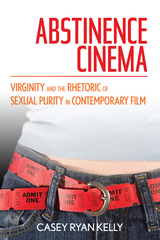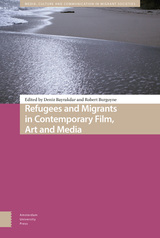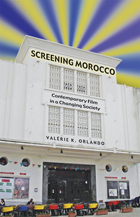3 books about Contemporary Film

Abstinence Cinema
Virginity and the Rhetoric of Sexual Purity in Contemporary Film
Casey Ryan Kelly
Rutgers University Press, 2016
Winner of the 2016 Diane Hope Book of the Year Award from the Visual Communication Division of the National Communication Association
From the perspective of cultural conservatives, Hollywood movies are cesspools of vice, exposing impressionable viewers to pernicious sexually-permissive messages. Offering a groundbreaking study of Hollywood films produced since 2000, Abstinence Cinema comes to a very different conclusion, finding echoes of the evangelical movement’s abstinence-only rhetoric in everything from Easy A to Taken.
From the perspective of cultural conservatives, Hollywood movies are cesspools of vice, exposing impressionable viewers to pernicious sexually-permissive messages. Offering a groundbreaking study of Hollywood films produced since 2000, Abstinence Cinema comes to a very different conclusion, finding echoes of the evangelical movement’s abstinence-only rhetoric in everything from Easy A to Taken.
Casey Ryan Kelly tracks the surprising sex-negative turn that Hollywood films have taken, associating premarital sex with shame and degradation, while romanticizing traditional nuclear families, courtship rituals, and gender roles. As he demonstrates, these movies are particularly disempowering for young women, concocting plots in which the decision to refrain from sex until marriage is the young woman’s primary source of agency and arbiter of moral worth. Locating these regressive sexual politics not only in expected sites, like the Twilight films, but surprising ones, like the raunchy comedies of Judd Apatow, Kelly makes a compelling case that Hollywood films have taken a significant step backward in recent years.
Abstinence Cinema offers close readings of movies from a wide spectrum of genres, and it puts these films into conversation with rhetoric that has emerged in other arenas of American culture. Challenging assumptions that we are living in a more liberated era, the book sounds a warning bell about the powerful cultural forces that seek to demonize sexuality and curtail female sexual agency.
[more]

Refugees and Migrants in Contemporary Film, Art and Media
Deniz Bayrakdar
Amsterdam University Press, 2022
Migration in the 21st century is one of the pre-eminent issues of our present historical moment, a phenomenon that has acquired new urgency with accelerating climate change, civil wars, and growing economic scarcities. Refugees and Migrants in Film, Art and Media consists of eleven essays that explore how artists have imaginatively engaged with this monumental human drama, examining a range of alternative modes of representation that provide striking new takes on the experiences of these precarious populations. Covering prominent art works by Ai Weiwei and Richard Mosse, and extending the spectrum of representation to refugee film workshops on the island of Lesvos as well as virtual reality installations of Alejandro G. Iñárritu and others, the chapters included here focus on the power of aesthetic engagement to illuminate the stories of refugees and migrants in ways that overturn journalistic clichés.
[more]

Screening Morocco
Contemporary Film in a Changing Society
Valérie K. Orlando
Ohio University Press, 2011
Since 1999 and the death of King Hassan II, Morocco has experienced adramatic social transformation. Encouraged by the more openly democraticclimate fostered by young King Mohammed VI, filmmakers have begunto explore the sociocultural and political debates of their country whilealso seeking to document the untold stories of a dark past.Screening Morocco: Contemporary Film in a ChangingSociety focuses on Moroccan films produced and distributedfrom 1999 to the present. Moroccan cinema serves as an all-inclusive medium that providesa sounding board for a society that is remaking itself.Male and female directors present the face of an engaged,multiethnic and multilingual society. Their cinematographypromotes a country that is dynamic and connected to theglobal sociocultural economy of the twenty-first century. Atthe same time, they seek to represent the closed, obscurepast of a nation’s history that has rarely been told, drawingon themes such as human rights abuse, the former incarcerationof thousands during the Lead Years, women’semancipation, poverty, and claims for social justice. Screening Morocco will introduce American readers to therichness in theme and scope of the cinematic production ofMorocco.
[more]
READERS
Browse our collection.
PUBLISHERS
See BiblioVault's publisher services.
STUDENT SERVICES
Files for college accessibility offices.
UChicago Accessibility Resources
home | accessibility | search | about | contact us
BiblioVault ® 2001 - 2024
The University of Chicago Press









